Corporate Social Responsibility: Perspectives and Theories Essay
VerifiedAdded on 2022/12/26
|15
|4492
|1
Essay
AI Summary
This essay delves into the multifaceted concept of Corporate Social Responsibility (CSR), examining its various definitions and the challenges in establishing a universally accepted framework. It explores diverse schools of thought, including neoliberal, neo-Keynesian, and radical political economy perspectives, and their influence on CSR practices. The essay traces the historical evolution of CSR, from its emergence in the late 19th century to its contemporary relevance, highlighting key events such as the rise of corporate power, the Great Depression, and the impact of globalization. It analyzes the role of multinational corporations, international agreements, and consumer awareness in shaping CSR trends. Furthermore, the essay defines CSR as a symbiotic relationship between business and society and discusses key theories, such as utilitarian theory, to justify the perspectives and frameworks that form the basis of corporate responsibility.
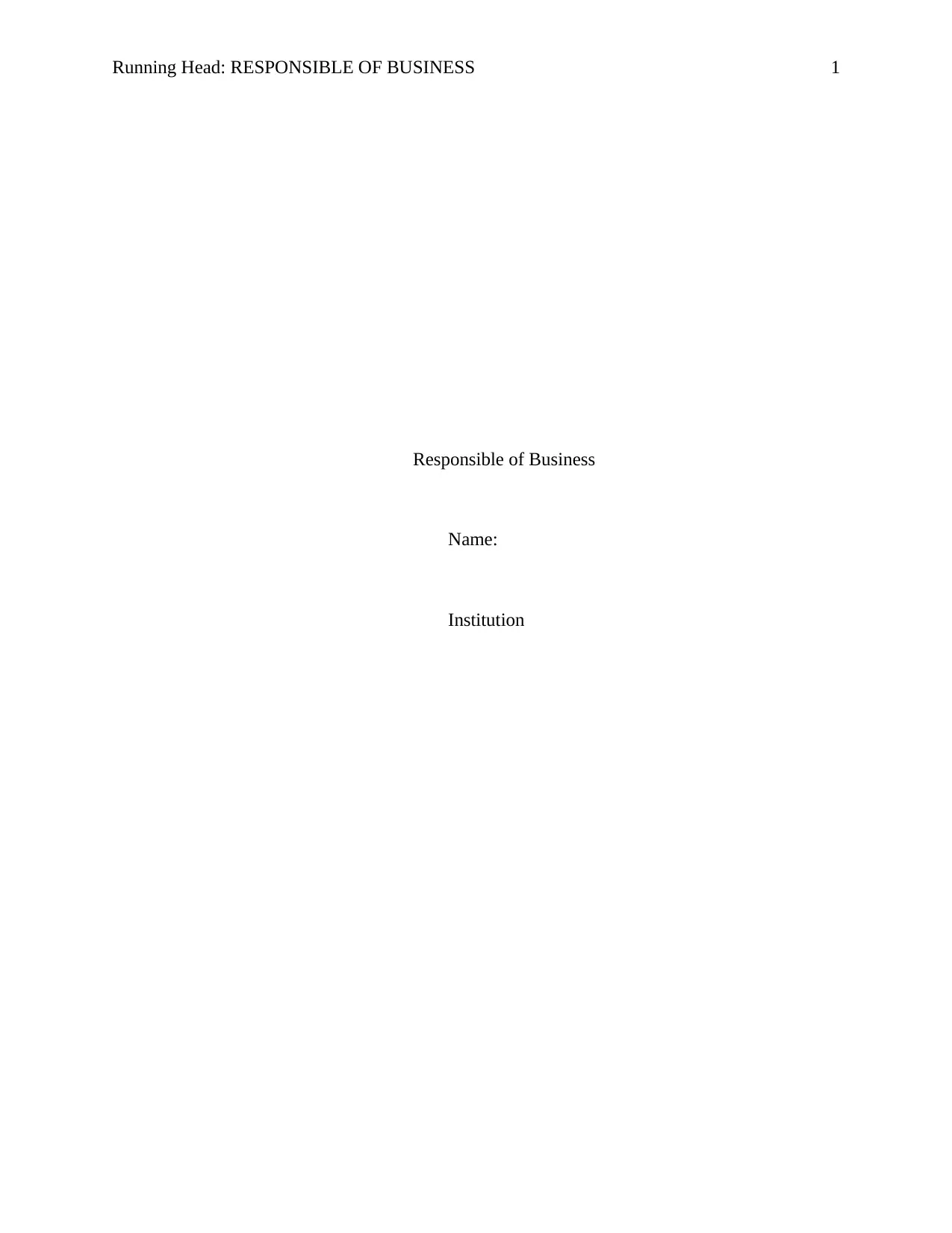
Running Head: RESPONSIBLE OF BUSINESS 1
Responsible of Business
Name:
Institution
Responsible of Business
Name:
Institution
Paraphrase This Document
Need a fresh take? Get an instant paraphrase of this document with our AI Paraphraser
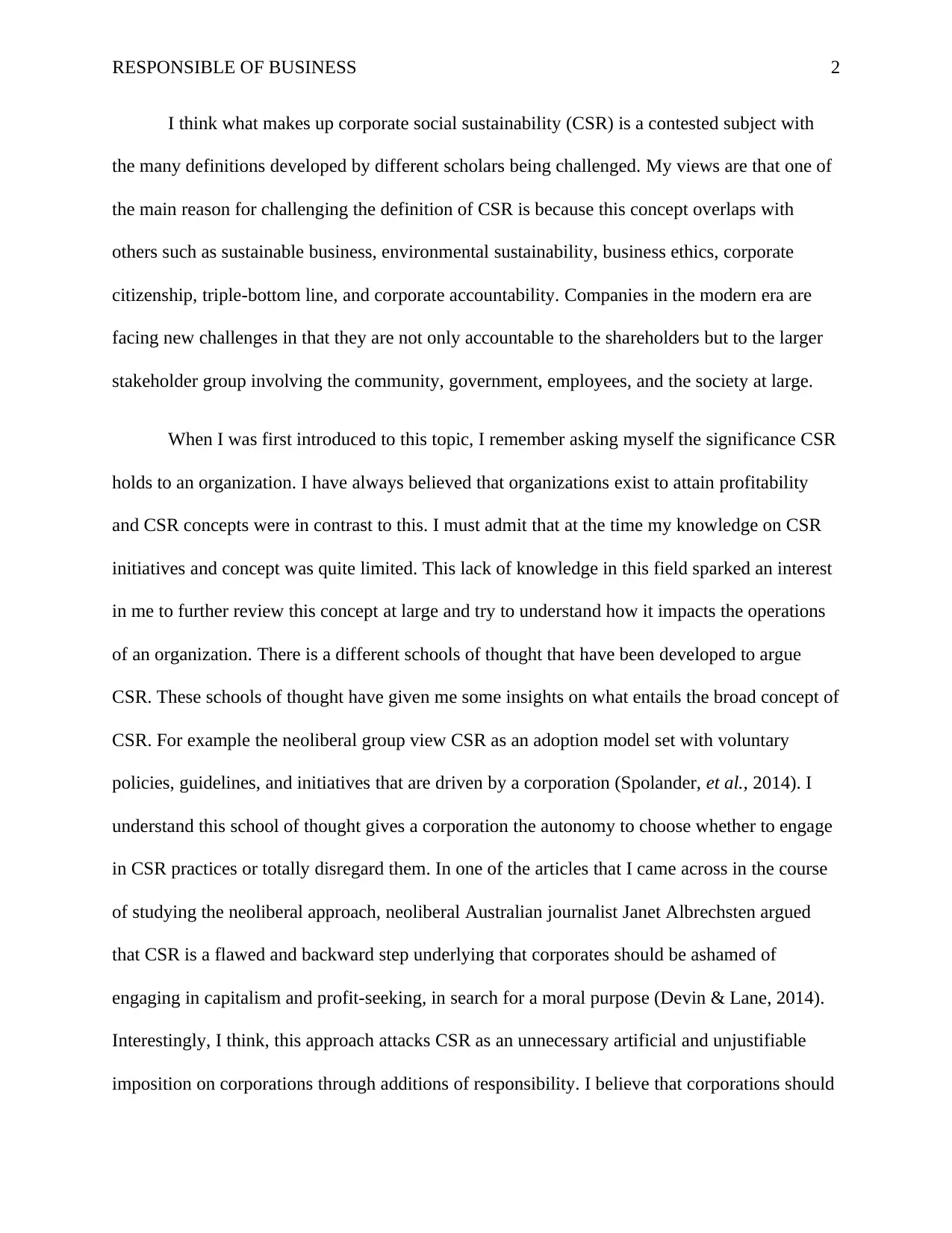
RESPONSIBLE OF BUSINESS 2
I think what makes up corporate social sustainability (CSR) is a contested subject with
the many definitions developed by different scholars being challenged. My views are that one of
the main reason for challenging the definition of CSR is because this concept overlaps with
others such as sustainable business, environmental sustainability, business ethics, corporate
citizenship, triple-bottom line, and corporate accountability. Companies in the modern era are
facing new challenges in that they are not only accountable to the shareholders but to the larger
stakeholder group involving the community, government, employees, and the society at large.
When I was first introduced to this topic, I remember asking myself the significance CSR
holds to an organization. I have always believed that organizations exist to attain profitability
and CSR concepts were in contrast to this. I must admit that at the time my knowledge on CSR
initiatives and concept was quite limited. This lack of knowledge in this field sparked an interest
in me to further review this concept at large and try to understand how it impacts the operations
of an organization. There is a different schools of thought that have been developed to argue
CSR. These schools of thought have given me some insights on what entails the broad concept of
CSR. For example the neoliberal group view CSR as an adoption model set with voluntary
policies, guidelines, and initiatives that are driven by a corporation (Spolander, et al., 2014). I
understand this school of thought gives a corporation the autonomy to choose whether to engage
in CSR practices or totally disregard them. In one of the articles that I came across in the course
of studying the neoliberal approach, neoliberal Australian journalist Janet Albrechsten argued
that CSR is a flawed and backward step underlying that corporates should be ashamed of
engaging in capitalism and profit-seeking, in search for a moral purpose (Devin & Lane, 2014).
Interestingly, I think, this approach attacks CSR as an unnecessary artificial and unjustifiable
imposition on corporations through additions of responsibility. I believe that corporations should
I think what makes up corporate social sustainability (CSR) is a contested subject with
the many definitions developed by different scholars being challenged. My views are that one of
the main reason for challenging the definition of CSR is because this concept overlaps with
others such as sustainable business, environmental sustainability, business ethics, corporate
citizenship, triple-bottom line, and corporate accountability. Companies in the modern era are
facing new challenges in that they are not only accountable to the shareholders but to the larger
stakeholder group involving the community, government, employees, and the society at large.
When I was first introduced to this topic, I remember asking myself the significance CSR
holds to an organization. I have always believed that organizations exist to attain profitability
and CSR concepts were in contrast to this. I must admit that at the time my knowledge on CSR
initiatives and concept was quite limited. This lack of knowledge in this field sparked an interest
in me to further review this concept at large and try to understand how it impacts the operations
of an organization. There is a different schools of thought that have been developed to argue
CSR. These schools of thought have given me some insights on what entails the broad concept of
CSR. For example the neoliberal group view CSR as an adoption model set with voluntary
policies, guidelines, and initiatives that are driven by a corporation (Spolander, et al., 2014). I
understand this school of thought gives a corporation the autonomy to choose whether to engage
in CSR practices or totally disregard them. In one of the articles that I came across in the course
of studying the neoliberal approach, neoliberal Australian journalist Janet Albrechsten argued
that CSR is a flawed and backward step underlying that corporates should be ashamed of
engaging in capitalism and profit-seeking, in search for a moral purpose (Devin & Lane, 2014).
Interestingly, I think, this approach attacks CSR as an unnecessary artificial and unjustifiable
imposition on corporations through additions of responsibility. I believe that corporations should
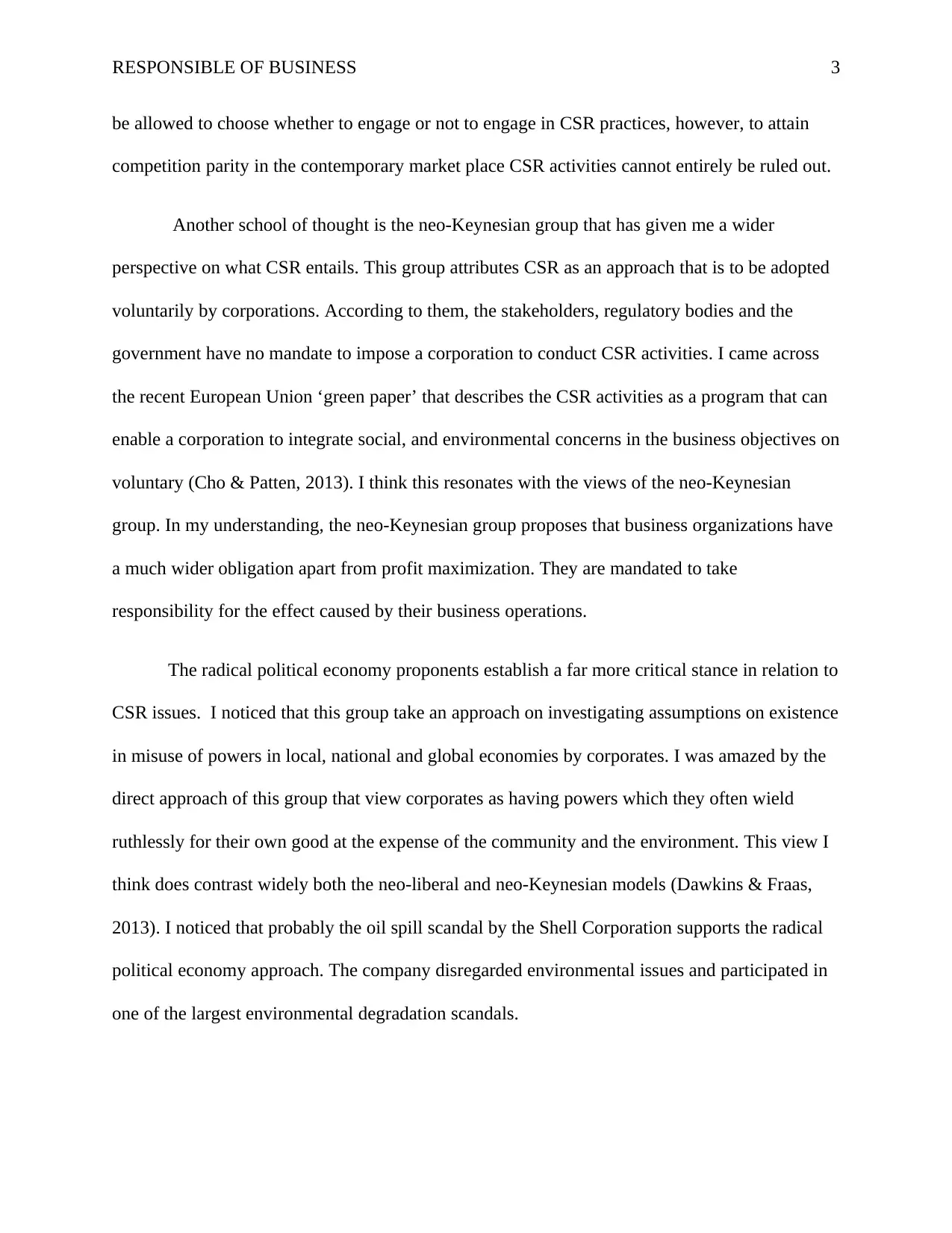
RESPONSIBLE OF BUSINESS 3
be allowed to choose whether to engage or not to engage in CSR practices, however, to attain
competition parity in the contemporary market place CSR activities cannot entirely be ruled out.
Another school of thought is the neo-Keynesian group that has given me a wider
perspective on what CSR entails. This group attributes CSR as an approach that is to be adopted
voluntarily by corporations. According to them, the stakeholders, regulatory bodies and the
government have no mandate to impose a corporation to conduct CSR activities. I came across
the recent European Union ‘green paper’ that describes the CSR activities as a program that can
enable a corporation to integrate social, and environmental concerns in the business objectives on
voluntary (Cho & Patten, 2013). I think this resonates with the views of the neo-Keynesian
group. In my understanding, the neo-Keynesian group proposes that business organizations have
a much wider obligation apart from profit maximization. They are mandated to take
responsibility for the effect caused by their business operations.
The radical political economy proponents establish a far more critical stance in relation to
CSR issues. I noticed that this group take an approach on investigating assumptions on existence
in misuse of powers in local, national and global economies by corporates. I was amazed by the
direct approach of this group that view corporates as having powers which they often wield
ruthlessly for their own good at the expense of the community and the environment. This view I
think does contrast widely both the neo-liberal and neo-Keynesian models (Dawkins & Fraas,
2013). I noticed that probably the oil spill scandal by the Shell Corporation supports the radical
political economy approach. The company disregarded environmental issues and participated in
one of the largest environmental degradation scandals.
be allowed to choose whether to engage or not to engage in CSR practices, however, to attain
competition parity in the contemporary market place CSR activities cannot entirely be ruled out.
Another school of thought is the neo-Keynesian group that has given me a wider
perspective on what CSR entails. This group attributes CSR as an approach that is to be adopted
voluntarily by corporations. According to them, the stakeholders, regulatory bodies and the
government have no mandate to impose a corporation to conduct CSR activities. I came across
the recent European Union ‘green paper’ that describes the CSR activities as a program that can
enable a corporation to integrate social, and environmental concerns in the business objectives on
voluntary (Cho & Patten, 2013). I think this resonates with the views of the neo-Keynesian
group. In my understanding, the neo-Keynesian group proposes that business organizations have
a much wider obligation apart from profit maximization. They are mandated to take
responsibility for the effect caused by their business operations.
The radical political economy proponents establish a far more critical stance in relation to
CSR issues. I noticed that this group take an approach on investigating assumptions on existence
in misuse of powers in local, national and global economies by corporates. I was amazed by the
direct approach of this group that view corporates as having powers which they often wield
ruthlessly for their own good at the expense of the community and the environment. This view I
think does contrast widely both the neo-liberal and neo-Keynesian models (Dawkins & Fraas,
2013). I noticed that probably the oil spill scandal by the Shell Corporation supports the radical
political economy approach. The company disregarded environmental issues and participated in
one of the largest environmental degradation scandals.
⊘ This is a preview!⊘
Do you want full access?
Subscribe today to unlock all pages.

Trusted by 1+ million students worldwide
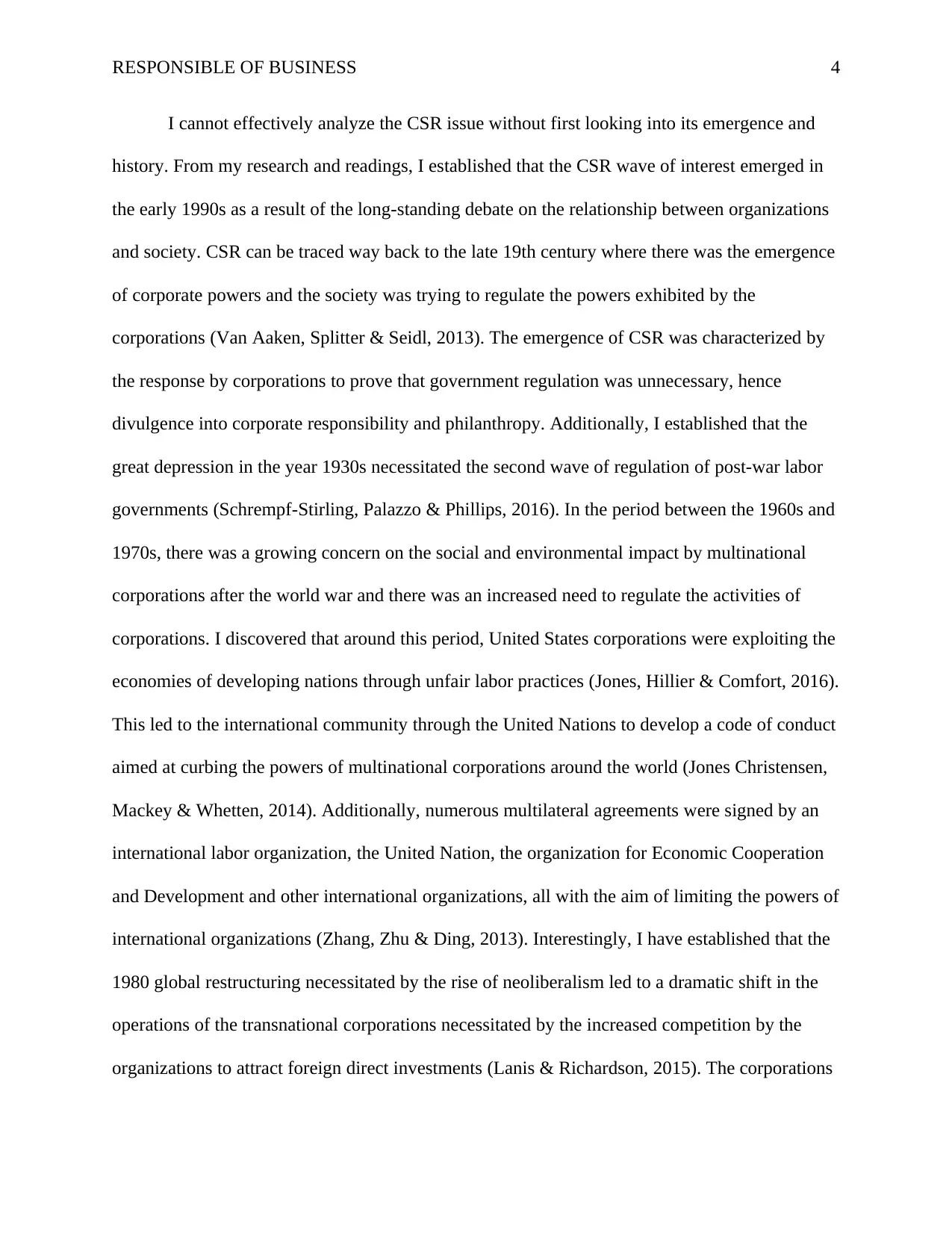
RESPONSIBLE OF BUSINESS 4
I cannot effectively analyze the CSR issue without first looking into its emergence and
history. From my research and readings, I established that the CSR wave of interest emerged in
the early 1990s as a result of the long-standing debate on the relationship between organizations
and society. CSR can be traced way back to the late 19th century where there was the emergence
of corporate powers and the society was trying to regulate the powers exhibited by the
corporations (Van Aaken, Splitter & Seidl, 2013). The emergence of CSR was characterized by
the response by corporations to prove that government regulation was unnecessary, hence
divulgence into corporate responsibility and philanthropy. Additionally, I established that the
great depression in the year 1930s necessitated the second wave of regulation of post-war labor
governments (Schrempf-Stirling, Palazzo & Phillips, 2016). In the period between the 1960s and
1970s, there was a growing concern on the social and environmental impact by multinational
corporations after the world war and there was an increased need to regulate the activities of
corporations. I discovered that around this period, United States corporations were exploiting the
economies of developing nations through unfair labor practices (Jones, Hillier & Comfort, 2016).
This led to the international community through the United Nations to develop a code of conduct
aimed at curbing the powers of multinational corporations around the world (Jones Christensen,
Mackey & Whetten, 2014). Additionally, numerous multilateral agreements were signed by an
international labor organization, the United Nation, the organization for Economic Cooperation
and Development and other international organizations, all with the aim of limiting the powers of
international organizations (Zhang, Zhu & Ding, 2013). Interestingly, I have established that the
1980 global restructuring necessitated by the rise of neoliberalism led to a dramatic shift in the
operations of the transnational corporations necessitated by the increased competition by the
organizations to attract foreign direct investments (Lanis & Richardson, 2015). The corporations
I cannot effectively analyze the CSR issue without first looking into its emergence and
history. From my research and readings, I established that the CSR wave of interest emerged in
the early 1990s as a result of the long-standing debate on the relationship between organizations
and society. CSR can be traced way back to the late 19th century where there was the emergence
of corporate powers and the society was trying to regulate the powers exhibited by the
corporations (Van Aaken, Splitter & Seidl, 2013). The emergence of CSR was characterized by
the response by corporations to prove that government regulation was unnecessary, hence
divulgence into corporate responsibility and philanthropy. Additionally, I established that the
great depression in the year 1930s necessitated the second wave of regulation of post-war labor
governments (Schrempf-Stirling, Palazzo & Phillips, 2016). In the period between the 1960s and
1970s, there was a growing concern on the social and environmental impact by multinational
corporations after the world war and there was an increased need to regulate the activities of
corporations. I discovered that around this period, United States corporations were exploiting the
economies of developing nations through unfair labor practices (Jones, Hillier & Comfort, 2016).
This led to the international community through the United Nations to develop a code of conduct
aimed at curbing the powers of multinational corporations around the world (Jones Christensen,
Mackey & Whetten, 2014). Additionally, numerous multilateral agreements were signed by an
international labor organization, the United Nation, the organization for Economic Cooperation
and Development and other international organizations, all with the aim of limiting the powers of
international organizations (Zhang, Zhu & Ding, 2013). Interestingly, I have established that the
1980 global restructuring necessitated by the rise of neoliberalism led to a dramatic shift in the
operations of the transnational corporations necessitated by the increased competition by the
organizations to attract foreign direct investments (Lanis & Richardson, 2015). The corporations
Paraphrase This Document
Need a fresh take? Get an instant paraphrase of this document with our AI Paraphraser
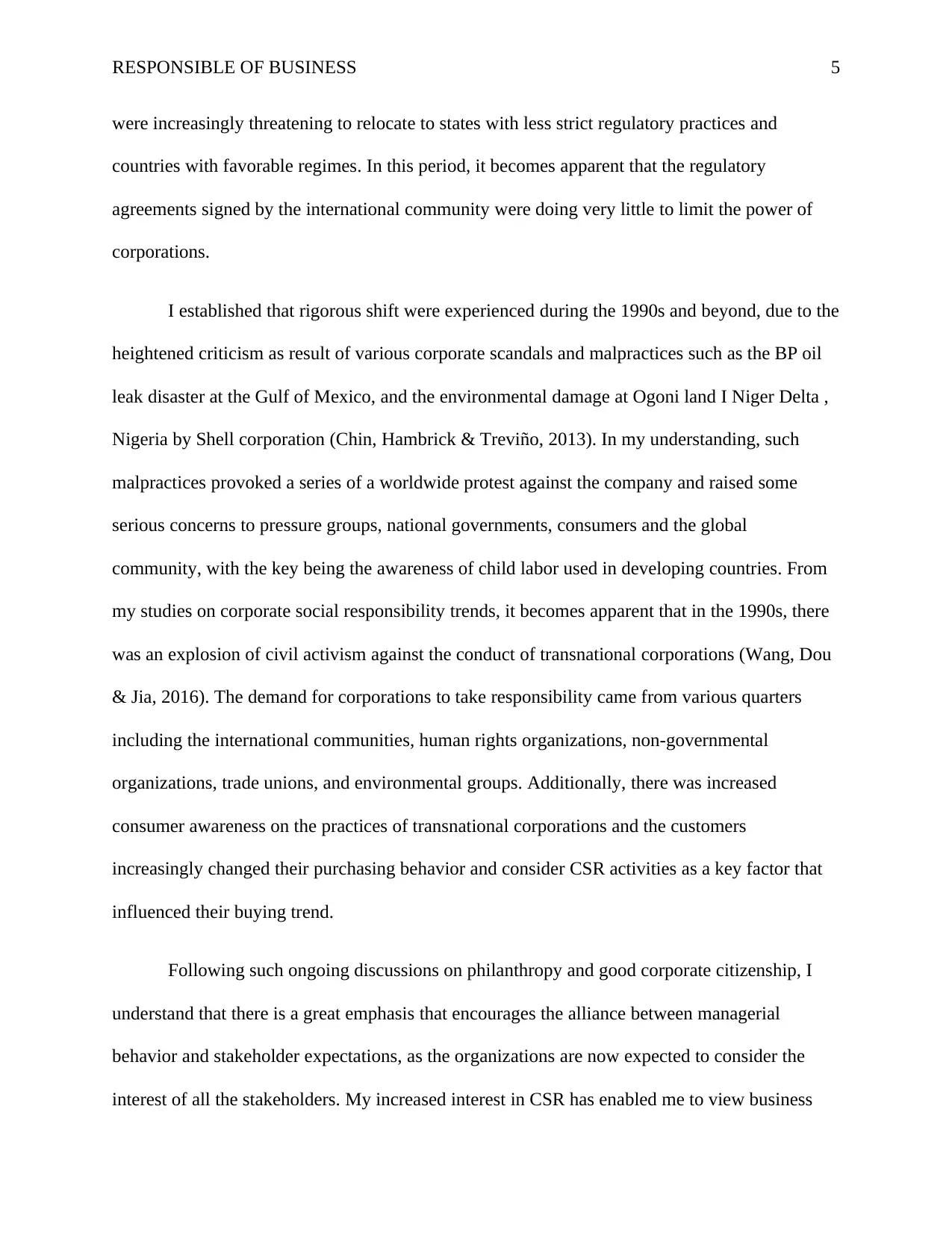
RESPONSIBLE OF BUSINESS 5
were increasingly threatening to relocate to states with less strict regulatory practices and
countries with favorable regimes. In this period, it becomes apparent that the regulatory
agreements signed by the international community were doing very little to limit the power of
corporations.
I established that rigorous shift were experienced during the 1990s and beyond, due to the
heightened criticism as result of various corporate scandals and malpractices such as the BP oil
leak disaster at the Gulf of Mexico, and the environmental damage at Ogoni land I Niger Delta ,
Nigeria by Shell corporation (Chin, Hambrick & Treviño, 2013). In my understanding, such
malpractices provoked a series of a worldwide protest against the company and raised some
serious concerns to pressure groups, national governments, consumers and the global
community, with the key being the awareness of child labor used in developing countries. From
my studies on corporate social responsibility trends, it becomes apparent that in the 1990s, there
was an explosion of civil activism against the conduct of transnational corporations (Wang, Dou
& Jia, 2016). The demand for corporations to take responsibility came from various quarters
including the international communities, human rights organizations, non-governmental
organizations, trade unions, and environmental groups. Additionally, there was increased
consumer awareness on the practices of transnational corporations and the customers
increasingly changed their purchasing behavior and consider CSR activities as a key factor that
influenced their buying trend.
Following such ongoing discussions on philanthropy and good corporate citizenship, I
understand that there is a great emphasis that encourages the alliance between managerial
behavior and stakeholder expectations, as the organizations are now expected to consider the
interest of all the stakeholders. My increased interest in CSR has enabled me to view business
were increasingly threatening to relocate to states with less strict regulatory practices and
countries with favorable regimes. In this period, it becomes apparent that the regulatory
agreements signed by the international community were doing very little to limit the power of
corporations.
I established that rigorous shift were experienced during the 1990s and beyond, due to the
heightened criticism as result of various corporate scandals and malpractices such as the BP oil
leak disaster at the Gulf of Mexico, and the environmental damage at Ogoni land I Niger Delta ,
Nigeria by Shell corporation (Chin, Hambrick & Treviño, 2013). In my understanding, such
malpractices provoked a series of a worldwide protest against the company and raised some
serious concerns to pressure groups, national governments, consumers and the global
community, with the key being the awareness of child labor used in developing countries. From
my studies on corporate social responsibility trends, it becomes apparent that in the 1990s, there
was an explosion of civil activism against the conduct of transnational corporations (Wang, Dou
& Jia, 2016). The demand for corporations to take responsibility came from various quarters
including the international communities, human rights organizations, non-governmental
organizations, trade unions, and environmental groups. Additionally, there was increased
consumer awareness on the practices of transnational corporations and the customers
increasingly changed their purchasing behavior and consider CSR activities as a key factor that
influenced their buying trend.
Following such ongoing discussions on philanthropy and good corporate citizenship, I
understand that there is a great emphasis that encourages the alliance between managerial
behavior and stakeholder expectations, as the organizations are now expected to consider the
interest of all the stakeholders. My increased interest in CSR has enabled me to view business
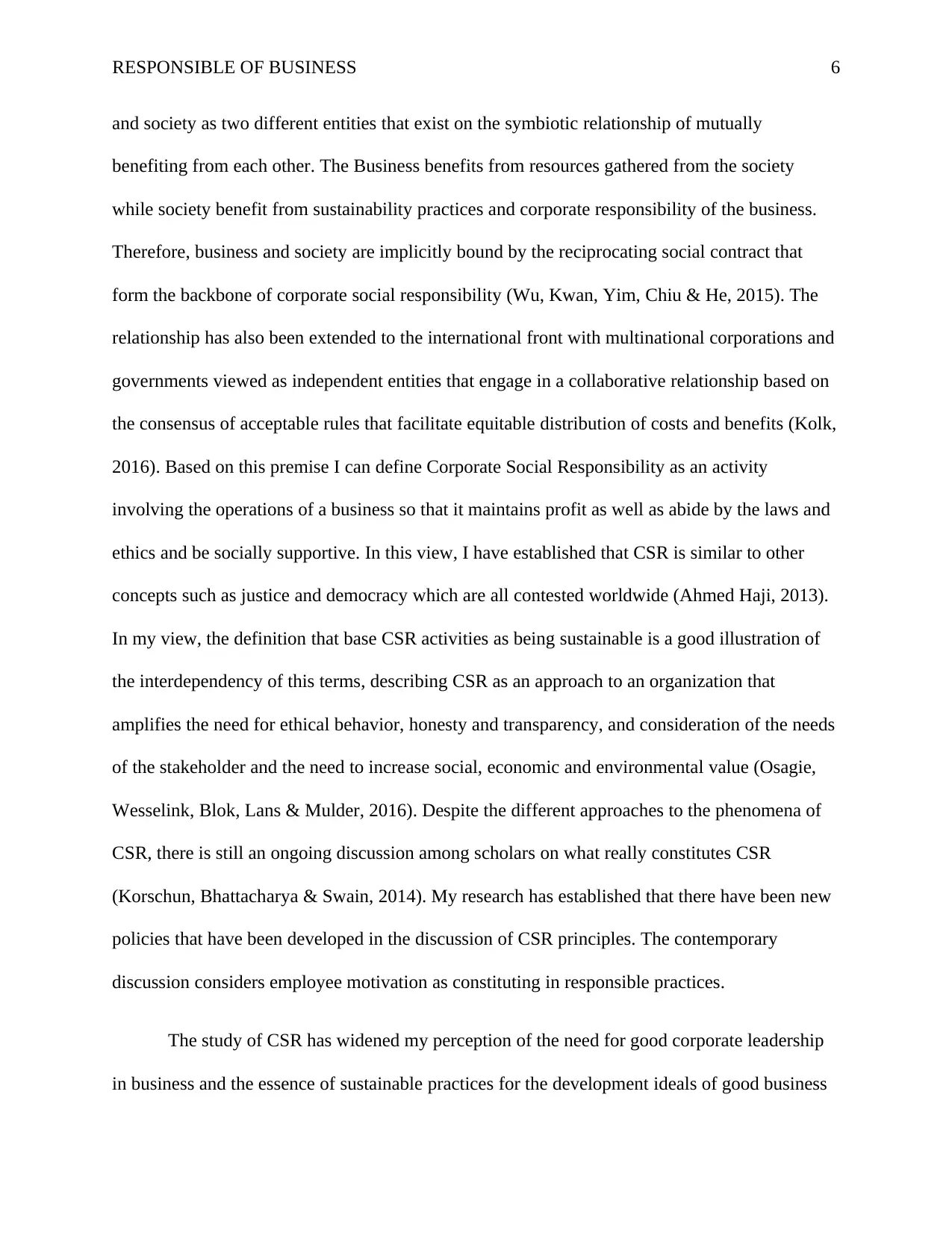
RESPONSIBLE OF BUSINESS 6
and society as two different entities that exist on the symbiotic relationship of mutually
benefiting from each other. The Business benefits from resources gathered from the society
while society benefit from sustainability practices and corporate responsibility of the business.
Therefore, business and society are implicitly bound by the reciprocating social contract that
form the backbone of corporate social responsibility (Wu, Kwan, Yim, Chiu & He, 2015). The
relationship has also been extended to the international front with multinational corporations and
governments viewed as independent entities that engage in a collaborative relationship based on
the consensus of acceptable rules that facilitate equitable distribution of costs and benefits (Kolk,
2016). Based on this premise I can define Corporate Social Responsibility as an activity
involving the operations of a business so that it maintains profit as well as abide by the laws and
ethics and be socially supportive. In this view, I have established that CSR is similar to other
concepts such as justice and democracy which are all contested worldwide (Ahmed Haji, 2013).
In my view, the definition that base CSR activities as being sustainable is a good illustration of
the interdependency of this terms, describing CSR as an approach to an organization that
amplifies the need for ethical behavior, honesty and transparency, and consideration of the needs
of the stakeholder and the need to increase social, economic and environmental value (Osagie,
Wesselink, Blok, Lans & Mulder, 2016). Despite the different approaches to the phenomena of
CSR, there is still an ongoing discussion among scholars on what really constitutes CSR
(Korschun, Bhattacharya & Swain, 2014). My research has established that there have been new
policies that have been developed in the discussion of CSR principles. The contemporary
discussion considers employee motivation as constituting in responsible practices.
The study of CSR has widened my perception of the need for good corporate leadership
in business and the essence of sustainable practices for the development ideals of good business
and society as two different entities that exist on the symbiotic relationship of mutually
benefiting from each other. The Business benefits from resources gathered from the society
while society benefit from sustainability practices and corporate responsibility of the business.
Therefore, business and society are implicitly bound by the reciprocating social contract that
form the backbone of corporate social responsibility (Wu, Kwan, Yim, Chiu & He, 2015). The
relationship has also been extended to the international front with multinational corporations and
governments viewed as independent entities that engage in a collaborative relationship based on
the consensus of acceptable rules that facilitate equitable distribution of costs and benefits (Kolk,
2016). Based on this premise I can define Corporate Social Responsibility as an activity
involving the operations of a business so that it maintains profit as well as abide by the laws and
ethics and be socially supportive. In this view, I have established that CSR is similar to other
concepts such as justice and democracy which are all contested worldwide (Ahmed Haji, 2013).
In my view, the definition that base CSR activities as being sustainable is a good illustration of
the interdependency of this terms, describing CSR as an approach to an organization that
amplifies the need for ethical behavior, honesty and transparency, and consideration of the needs
of the stakeholder and the need to increase social, economic and environmental value (Osagie,
Wesselink, Blok, Lans & Mulder, 2016). Despite the different approaches to the phenomena of
CSR, there is still an ongoing discussion among scholars on what really constitutes CSR
(Korschun, Bhattacharya & Swain, 2014). My research has established that there have been new
policies that have been developed in the discussion of CSR principles. The contemporary
discussion considers employee motivation as constituting in responsible practices.
The study of CSR has widened my perception of the need for good corporate leadership
in business and the essence of sustainable practices for the development ideals of good business
⊘ This is a preview!⊘
Do you want full access?
Subscribe today to unlock all pages.

Trusted by 1+ million students worldwide
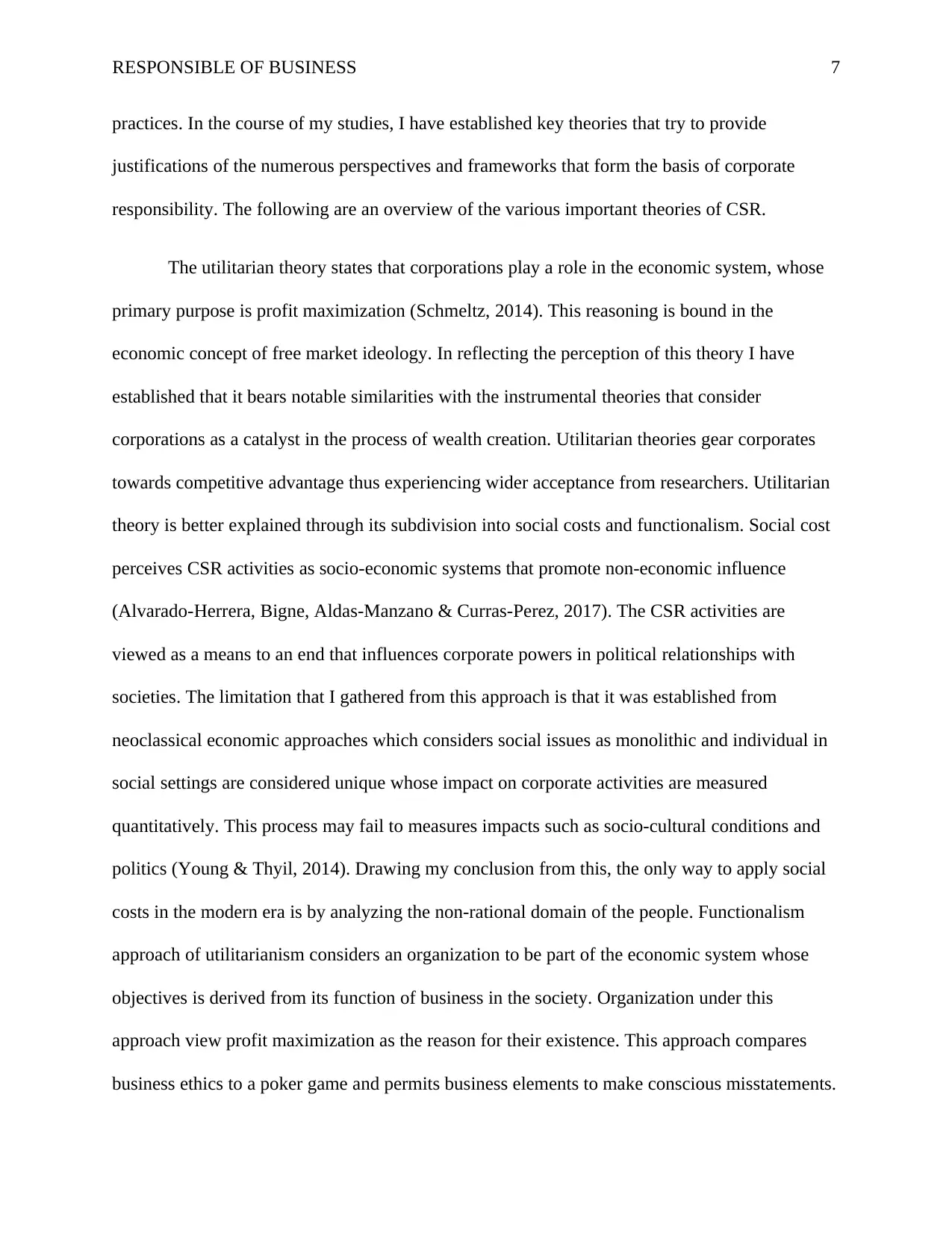
RESPONSIBLE OF BUSINESS 7
practices. In the course of my studies, I have established key theories that try to provide
justifications of the numerous perspectives and frameworks that form the basis of corporate
responsibility. The following are an overview of the various important theories of CSR.
The utilitarian theory states that corporations play a role in the economic system, whose
primary purpose is profit maximization (Schmeltz, 2014). This reasoning is bound in the
economic concept of free market ideology. In reflecting the perception of this theory I have
established that it bears notable similarities with the instrumental theories that consider
corporations as a catalyst in the process of wealth creation. Utilitarian theories gear corporates
towards competitive advantage thus experiencing wider acceptance from researchers. Utilitarian
theory is better explained through its subdivision into social costs and functionalism. Social cost
perceives CSR activities as socio-economic systems that promote non-economic influence
(Alvarado-Herrera, Bigne, Aldas-Manzano & Curras-Perez, 2017). The CSR activities are
viewed as a means to an end that influences corporate powers in political relationships with
societies. The limitation that I gathered from this approach is that it was established from
neoclassical economic approaches which considers social issues as monolithic and individual in
social settings are considered unique whose impact on corporate activities are measured
quantitatively. This process may fail to measures impacts such as socio-cultural conditions and
politics (Young & Thyil, 2014). Drawing my conclusion from this, the only way to apply social
costs in the modern era is by analyzing the non-rational domain of the people. Functionalism
approach of utilitarianism considers an organization to be part of the economic system whose
objectives is derived from its function of business in the society. Organization under this
approach view profit maximization as the reason for their existence. This approach compares
business ethics to a poker game and permits business elements to make conscious misstatements.
practices. In the course of my studies, I have established key theories that try to provide
justifications of the numerous perspectives and frameworks that form the basis of corporate
responsibility. The following are an overview of the various important theories of CSR.
The utilitarian theory states that corporations play a role in the economic system, whose
primary purpose is profit maximization (Schmeltz, 2014). This reasoning is bound in the
economic concept of free market ideology. In reflecting the perception of this theory I have
established that it bears notable similarities with the instrumental theories that consider
corporations as a catalyst in the process of wealth creation. Utilitarian theories gear corporates
towards competitive advantage thus experiencing wider acceptance from researchers. Utilitarian
theory is better explained through its subdivision into social costs and functionalism. Social cost
perceives CSR activities as socio-economic systems that promote non-economic influence
(Alvarado-Herrera, Bigne, Aldas-Manzano & Curras-Perez, 2017). The CSR activities are
viewed as a means to an end that influences corporate powers in political relationships with
societies. The limitation that I gathered from this approach is that it was established from
neoclassical economic approaches which considers social issues as monolithic and individual in
social settings are considered unique whose impact on corporate activities are measured
quantitatively. This process may fail to measures impacts such as socio-cultural conditions and
politics (Young & Thyil, 2014). Drawing my conclusion from this, the only way to apply social
costs in the modern era is by analyzing the non-rational domain of the people. Functionalism
approach of utilitarianism considers an organization to be part of the economic system whose
objectives is derived from its function of business in the society. Organization under this
approach view profit maximization as the reason for their existence. This approach compares
business ethics to a poker game and permits business elements to make conscious misstatements.
Paraphrase This Document
Need a fresh take? Get an instant paraphrase of this document with our AI Paraphraser
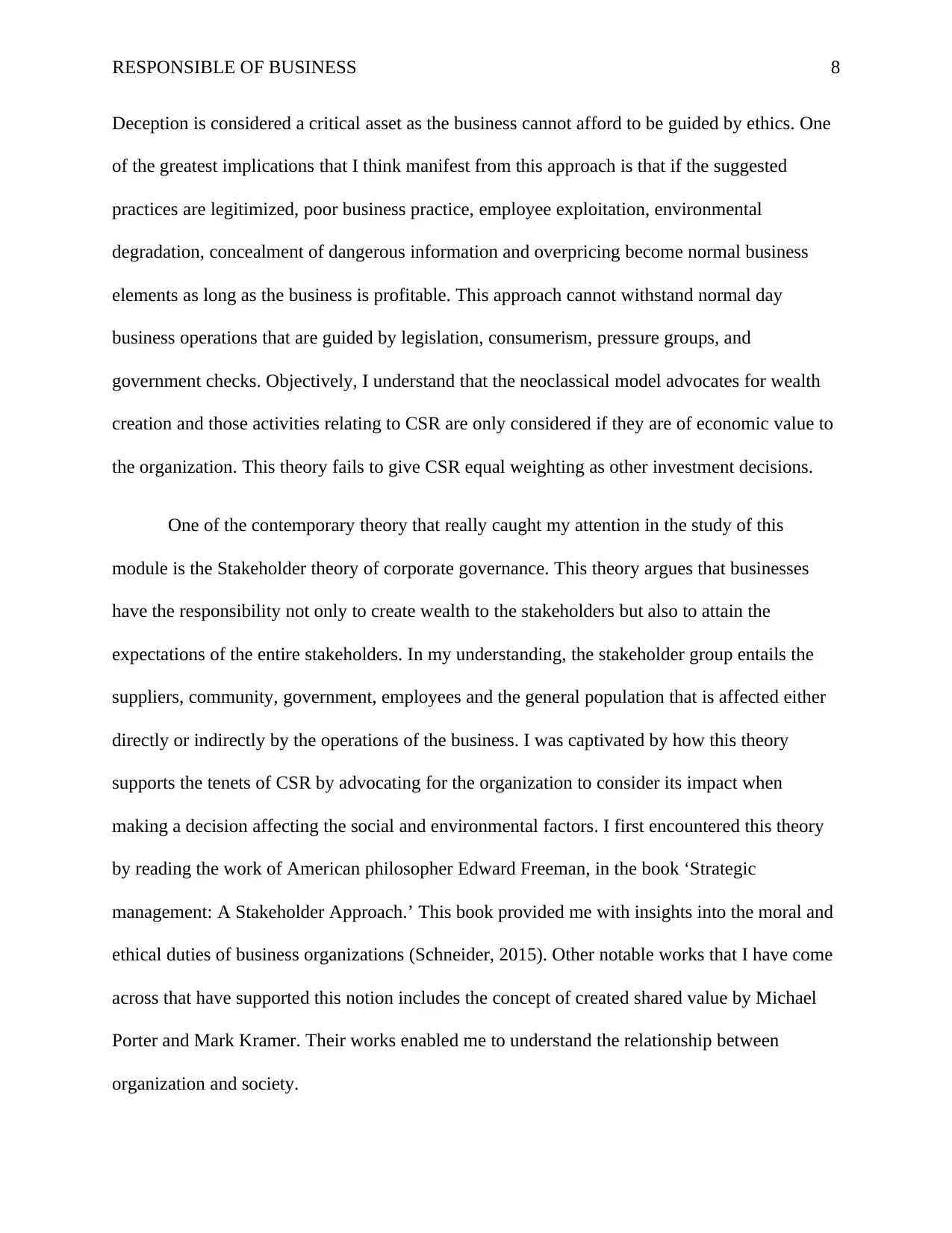
RESPONSIBLE OF BUSINESS 8
Deception is considered a critical asset as the business cannot afford to be guided by ethics. One
of the greatest implications that I think manifest from this approach is that if the suggested
practices are legitimized, poor business practice, employee exploitation, environmental
degradation, concealment of dangerous information and overpricing become normal business
elements as long as the business is profitable. This approach cannot withstand normal day
business operations that are guided by legislation, consumerism, pressure groups, and
government checks. Objectively, I understand that the neoclassical model advocates for wealth
creation and those activities relating to CSR are only considered if they are of economic value to
the organization. This theory fails to give CSR equal weighting as other investment decisions.
One of the contemporary theory that really caught my attention in the study of this
module is the Stakeholder theory of corporate governance. This theory argues that businesses
have the responsibility not only to create wealth to the stakeholders but also to attain the
expectations of the entire stakeholders. In my understanding, the stakeholder group entails the
suppliers, community, government, employees and the general population that is affected either
directly or indirectly by the operations of the business. I was captivated by how this theory
supports the tenets of CSR by advocating for the organization to consider its impact when
making a decision affecting the social and environmental factors. I first encountered this theory
by reading the work of American philosopher Edward Freeman, in the book ‘Strategic
management: A Stakeholder Approach.’ This book provided me with insights into the moral and
ethical duties of business organizations (Schneider, 2015). Other notable works that I have come
across that have supported this notion includes the concept of created shared value by Michael
Porter and Mark Kramer. Their works enabled me to understand the relationship between
organization and society.
Deception is considered a critical asset as the business cannot afford to be guided by ethics. One
of the greatest implications that I think manifest from this approach is that if the suggested
practices are legitimized, poor business practice, employee exploitation, environmental
degradation, concealment of dangerous information and overpricing become normal business
elements as long as the business is profitable. This approach cannot withstand normal day
business operations that are guided by legislation, consumerism, pressure groups, and
government checks. Objectively, I understand that the neoclassical model advocates for wealth
creation and those activities relating to CSR are only considered if they are of economic value to
the organization. This theory fails to give CSR equal weighting as other investment decisions.
One of the contemporary theory that really caught my attention in the study of this
module is the Stakeholder theory of corporate governance. This theory argues that businesses
have the responsibility not only to create wealth to the stakeholders but also to attain the
expectations of the entire stakeholders. In my understanding, the stakeholder group entails the
suppliers, community, government, employees and the general population that is affected either
directly or indirectly by the operations of the business. I was captivated by how this theory
supports the tenets of CSR by advocating for the organization to consider its impact when
making a decision affecting the social and environmental factors. I first encountered this theory
by reading the work of American philosopher Edward Freeman, in the book ‘Strategic
management: A Stakeholder Approach.’ This book provided me with insights into the moral and
ethical duties of business organizations (Schneider, 2015). Other notable works that I have come
across that have supported this notion includes the concept of created shared value by Michael
Porter and Mark Kramer. Their works enabled me to understand the relationship between
organization and society.
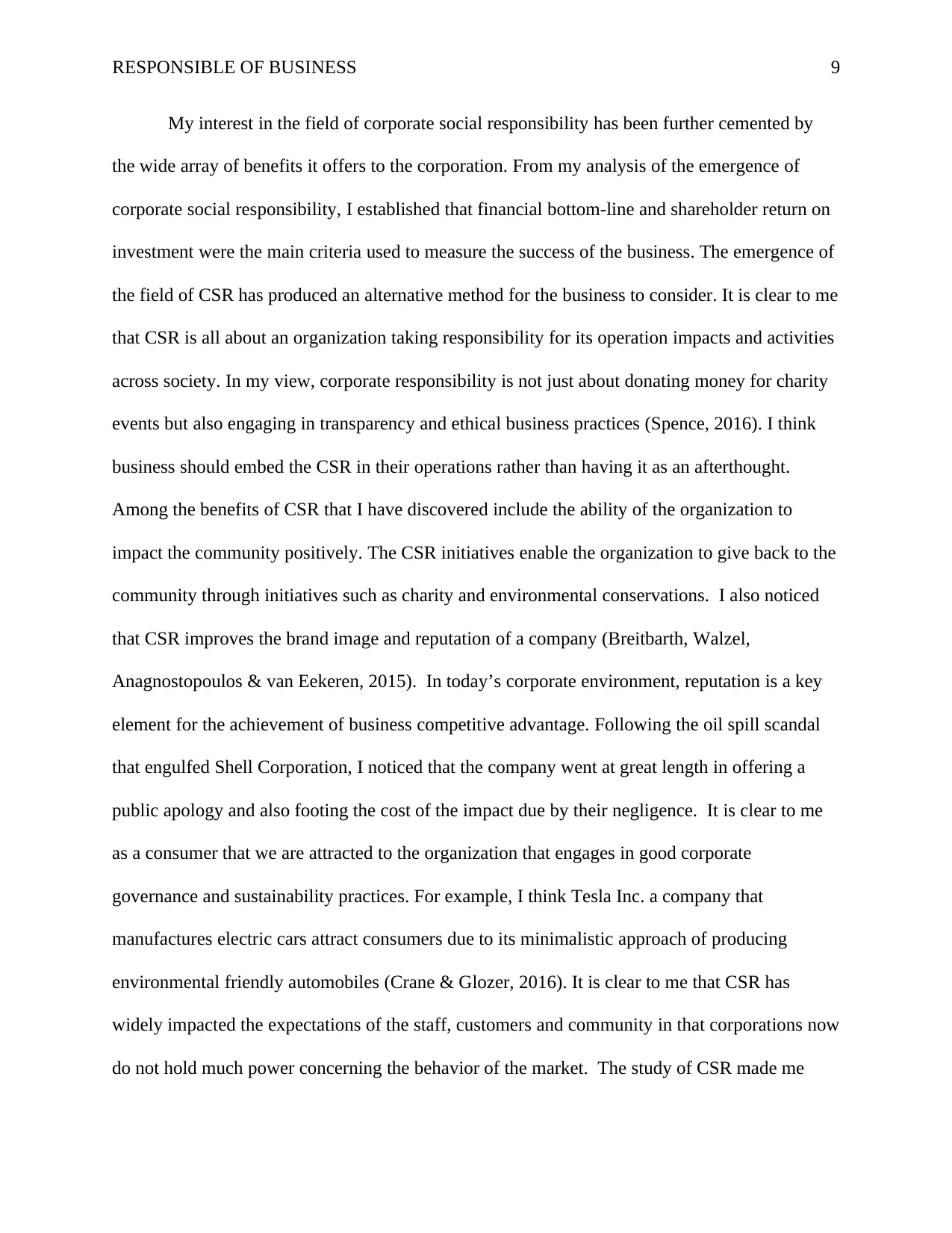
RESPONSIBLE OF BUSINESS 9
My interest in the field of corporate social responsibility has been further cemented by
the wide array of benefits it offers to the corporation. From my analysis of the emergence of
corporate social responsibility, I established that financial bottom-line and shareholder return on
investment were the main criteria used to measure the success of the business. The emergence of
the field of CSR has produced an alternative method for the business to consider. It is clear to me
that CSR is all about an organization taking responsibility for its operation impacts and activities
across society. In my view, corporate responsibility is not just about donating money for charity
events but also engaging in transparency and ethical business practices (Spence, 2016). I think
business should embed the CSR in their operations rather than having it as an afterthought.
Among the benefits of CSR that I have discovered include the ability of the organization to
impact the community positively. The CSR initiatives enable the organization to give back to the
community through initiatives such as charity and environmental conservations. I also noticed
that CSR improves the brand image and reputation of a company (Breitbarth, Walzel,
Anagnostopoulos & van Eekeren, 2015). In today’s corporate environment, reputation is a key
element for the achievement of business competitive advantage. Following the oil spill scandal
that engulfed Shell Corporation, I noticed that the company went at great length in offering a
public apology and also footing the cost of the impact due by their negligence. It is clear to me
as a consumer that we are attracted to the organization that engages in good corporate
governance and sustainability practices. For example, I think Tesla Inc. a company that
manufactures electric cars attract consumers due to its minimalistic approach of producing
environmental friendly automobiles (Crane & Glozer, 2016). It is clear to me that CSR has
widely impacted the expectations of the staff, customers and community in that corporations now
do not hold much power concerning the behavior of the market. The study of CSR made me
My interest in the field of corporate social responsibility has been further cemented by
the wide array of benefits it offers to the corporation. From my analysis of the emergence of
corporate social responsibility, I established that financial bottom-line and shareholder return on
investment were the main criteria used to measure the success of the business. The emergence of
the field of CSR has produced an alternative method for the business to consider. It is clear to me
that CSR is all about an organization taking responsibility for its operation impacts and activities
across society. In my view, corporate responsibility is not just about donating money for charity
events but also engaging in transparency and ethical business practices (Spence, 2016). I think
business should embed the CSR in their operations rather than having it as an afterthought.
Among the benefits of CSR that I have discovered include the ability of the organization to
impact the community positively. The CSR initiatives enable the organization to give back to the
community through initiatives such as charity and environmental conservations. I also noticed
that CSR improves the brand image and reputation of a company (Breitbarth, Walzel,
Anagnostopoulos & van Eekeren, 2015). In today’s corporate environment, reputation is a key
element for the achievement of business competitive advantage. Following the oil spill scandal
that engulfed Shell Corporation, I noticed that the company went at great length in offering a
public apology and also footing the cost of the impact due by their negligence. It is clear to me
as a consumer that we are attracted to the organization that engages in good corporate
governance and sustainability practices. For example, I think Tesla Inc. a company that
manufactures electric cars attract consumers due to its minimalistic approach of producing
environmental friendly automobiles (Crane & Glozer, 2016). It is clear to me that CSR has
widely impacted the expectations of the staff, customers and community in that corporations now
do not hold much power concerning the behavior of the market. The study of CSR made me
⊘ This is a preview!⊘
Do you want full access?
Subscribe today to unlock all pages.

Trusted by 1+ million students worldwide
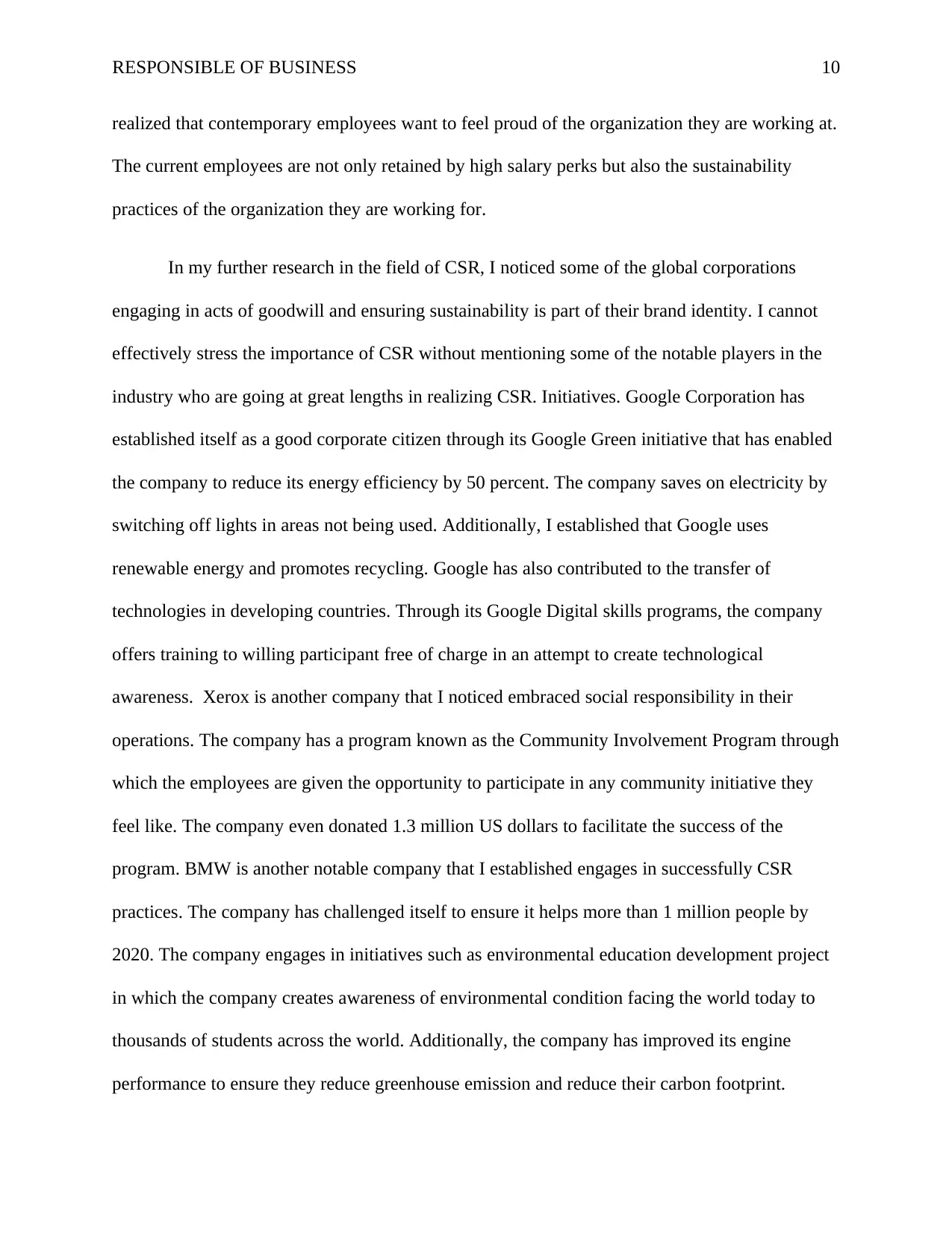
RESPONSIBLE OF BUSINESS 10
realized that contemporary employees want to feel proud of the organization they are working at.
The current employees are not only retained by high salary perks but also the sustainability
practices of the organization they are working for.
In my further research in the field of CSR, I noticed some of the global corporations
engaging in acts of goodwill and ensuring sustainability is part of their brand identity. I cannot
effectively stress the importance of CSR without mentioning some of the notable players in the
industry who are going at great lengths in realizing CSR. Initiatives. Google Corporation has
established itself as a good corporate citizen through its Google Green initiative that has enabled
the company to reduce its energy efficiency by 50 percent. The company saves on electricity by
switching off lights in areas not being used. Additionally, I established that Google uses
renewable energy and promotes recycling. Google has also contributed to the transfer of
technologies in developing countries. Through its Google Digital skills programs, the company
offers training to willing participant free of charge in an attempt to create technological
awareness. Xerox is another company that I noticed embraced social responsibility in their
operations. The company has a program known as the Community Involvement Program through
which the employees are given the opportunity to participate in any community initiative they
feel like. The company even donated 1.3 million US dollars to facilitate the success of the
program. BMW is another notable company that I established engages in successfully CSR
practices. The company has challenged itself to ensure it helps more than 1 million people by
2020. The company engages in initiatives such as environmental education development project
in which the company creates awareness of environmental condition facing the world today to
thousands of students across the world. Additionally, the company has improved its engine
performance to ensure they reduce greenhouse emission and reduce their carbon footprint.
realized that contemporary employees want to feel proud of the organization they are working at.
The current employees are not only retained by high salary perks but also the sustainability
practices of the organization they are working for.
In my further research in the field of CSR, I noticed some of the global corporations
engaging in acts of goodwill and ensuring sustainability is part of their brand identity. I cannot
effectively stress the importance of CSR without mentioning some of the notable players in the
industry who are going at great lengths in realizing CSR. Initiatives. Google Corporation has
established itself as a good corporate citizen through its Google Green initiative that has enabled
the company to reduce its energy efficiency by 50 percent. The company saves on electricity by
switching off lights in areas not being used. Additionally, I established that Google uses
renewable energy and promotes recycling. Google has also contributed to the transfer of
technologies in developing countries. Through its Google Digital skills programs, the company
offers training to willing participant free of charge in an attempt to create technological
awareness. Xerox is another company that I noticed embraced social responsibility in their
operations. The company has a program known as the Community Involvement Program through
which the employees are given the opportunity to participate in any community initiative they
feel like. The company even donated 1.3 million US dollars to facilitate the success of the
program. BMW is another notable company that I established engages in successfully CSR
practices. The company has challenged itself to ensure it helps more than 1 million people by
2020. The company engages in initiatives such as environmental education development project
in which the company creates awareness of environmental condition facing the world today to
thousands of students across the world. Additionally, the company has improved its engine
performance to ensure they reduce greenhouse emission and reduce their carbon footprint.
Paraphrase This Document
Need a fresh take? Get an instant paraphrase of this document with our AI Paraphraser
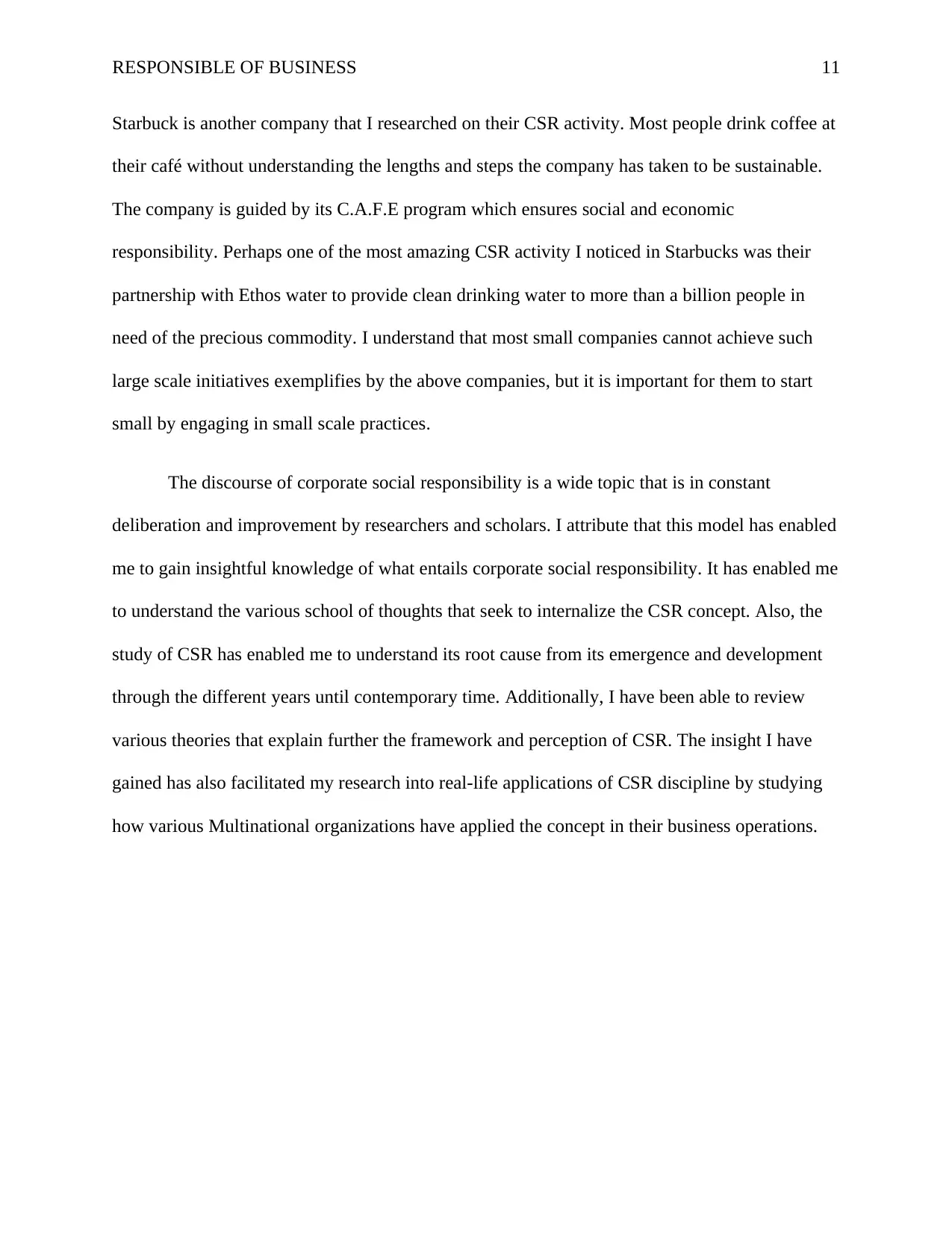
RESPONSIBLE OF BUSINESS 11
Starbuck is another company that I researched on their CSR activity. Most people drink coffee at
their café without understanding the lengths and steps the company has taken to be sustainable.
The company is guided by its C.A.F.E program which ensures social and economic
responsibility. Perhaps one of the most amazing CSR activity I noticed in Starbucks was their
partnership with Ethos water to provide clean drinking water to more than a billion people in
need of the precious commodity. I understand that most small companies cannot achieve such
large scale initiatives exemplifies by the above companies, but it is important for them to start
small by engaging in small scale practices.
The discourse of corporate social responsibility is a wide topic that is in constant
deliberation and improvement by researchers and scholars. I attribute that this model has enabled
me to gain insightful knowledge of what entails corporate social responsibility. It has enabled me
to understand the various school of thoughts that seek to internalize the CSR concept. Also, the
study of CSR has enabled me to understand its root cause from its emergence and development
through the different years until contemporary time. Additionally, I have been able to review
various theories that explain further the framework and perception of CSR. The insight I have
gained has also facilitated my research into real-life applications of CSR discipline by studying
how various Multinational organizations have applied the concept in their business operations.
Starbuck is another company that I researched on their CSR activity. Most people drink coffee at
their café without understanding the lengths and steps the company has taken to be sustainable.
The company is guided by its C.A.F.E program which ensures social and economic
responsibility. Perhaps one of the most amazing CSR activity I noticed in Starbucks was their
partnership with Ethos water to provide clean drinking water to more than a billion people in
need of the precious commodity. I understand that most small companies cannot achieve such
large scale initiatives exemplifies by the above companies, but it is important for them to start
small by engaging in small scale practices.
The discourse of corporate social responsibility is a wide topic that is in constant
deliberation and improvement by researchers and scholars. I attribute that this model has enabled
me to gain insightful knowledge of what entails corporate social responsibility. It has enabled me
to understand the various school of thoughts that seek to internalize the CSR concept. Also, the
study of CSR has enabled me to understand its root cause from its emergence and development
through the different years until contemporary time. Additionally, I have been able to review
various theories that explain further the framework and perception of CSR. The insight I have
gained has also facilitated my research into real-life applications of CSR discipline by studying
how various Multinational organizations have applied the concept in their business operations.
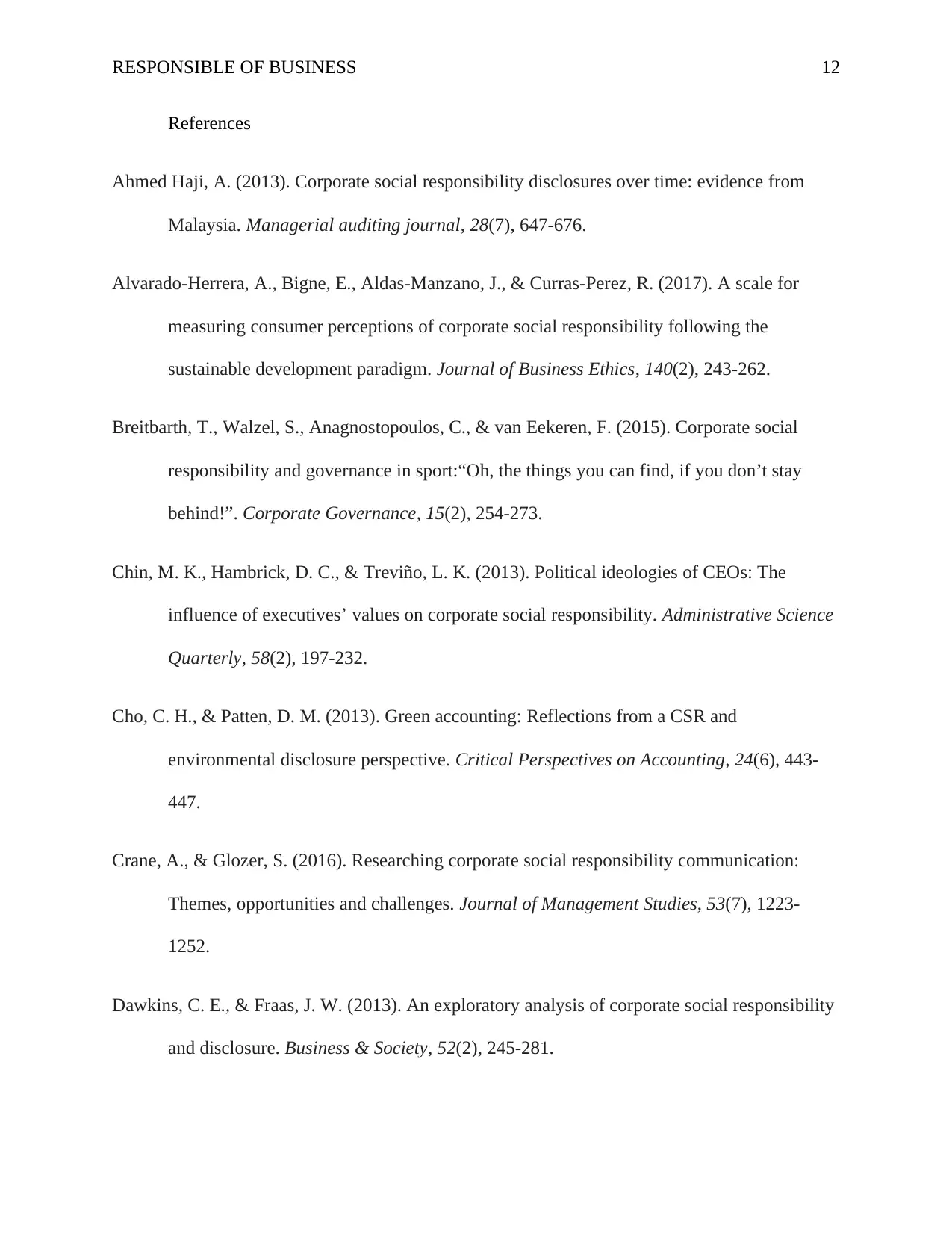
RESPONSIBLE OF BUSINESS 12
References
Ahmed Haji, A. (2013). Corporate social responsibility disclosures over time: evidence from
Malaysia. Managerial auditing journal, 28(7), 647-676.
Alvarado-Herrera, A., Bigne, E., Aldas-Manzano, J., & Curras-Perez, R. (2017). A scale for
measuring consumer perceptions of corporate social responsibility following the
sustainable development paradigm. Journal of Business Ethics, 140(2), 243-262.
Breitbarth, T., Walzel, S., Anagnostopoulos, C., & van Eekeren, F. (2015). Corporate social
responsibility and governance in sport:“Oh, the things you can find, if you don’t stay
behind!”. Corporate Governance, 15(2), 254-273.
Chin, M. K., Hambrick, D. C., & Treviño, L. K. (2013). Political ideologies of CEOs: The
influence of executives’ values on corporate social responsibility. Administrative Science
Quarterly, 58(2), 197-232.
Cho, C. H., & Patten, D. M. (2013). Green accounting: Reflections from a CSR and
environmental disclosure perspective. Critical Perspectives on Accounting, 24(6), 443-
447.
Crane, A., & Glozer, S. (2016). Researching corporate social responsibility communication:
Themes, opportunities and challenges. Journal of Management Studies, 53(7), 1223-
1252.
Dawkins, C. E., & Fraas, J. W. (2013). An exploratory analysis of corporate social responsibility
and disclosure. Business & Society, 52(2), 245-281.
References
Ahmed Haji, A. (2013). Corporate social responsibility disclosures over time: evidence from
Malaysia. Managerial auditing journal, 28(7), 647-676.
Alvarado-Herrera, A., Bigne, E., Aldas-Manzano, J., & Curras-Perez, R. (2017). A scale for
measuring consumer perceptions of corporate social responsibility following the
sustainable development paradigm. Journal of Business Ethics, 140(2), 243-262.
Breitbarth, T., Walzel, S., Anagnostopoulos, C., & van Eekeren, F. (2015). Corporate social
responsibility and governance in sport:“Oh, the things you can find, if you don’t stay
behind!”. Corporate Governance, 15(2), 254-273.
Chin, M. K., Hambrick, D. C., & Treviño, L. K. (2013). Political ideologies of CEOs: The
influence of executives’ values on corporate social responsibility. Administrative Science
Quarterly, 58(2), 197-232.
Cho, C. H., & Patten, D. M. (2013). Green accounting: Reflections from a CSR and
environmental disclosure perspective. Critical Perspectives on Accounting, 24(6), 443-
447.
Crane, A., & Glozer, S. (2016). Researching corporate social responsibility communication:
Themes, opportunities and challenges. Journal of Management Studies, 53(7), 1223-
1252.
Dawkins, C. E., & Fraas, J. W. (2013). An exploratory analysis of corporate social responsibility
and disclosure. Business & Society, 52(2), 245-281.
⊘ This is a preview!⊘
Do you want full access?
Subscribe today to unlock all pages.

Trusted by 1+ million students worldwide
1 out of 15
Related Documents
Your All-in-One AI-Powered Toolkit for Academic Success.
+13062052269
info@desklib.com
Available 24*7 on WhatsApp / Email
![[object Object]](/_next/static/media/star-bottom.7253800d.svg)
Unlock your academic potential
Copyright © 2020–2025 A2Z Services. All Rights Reserved. Developed and managed by ZUCOL.



